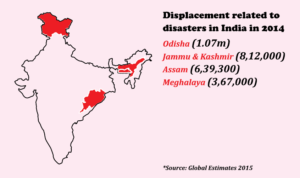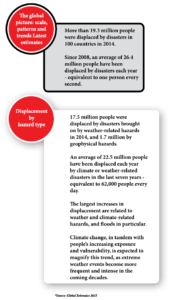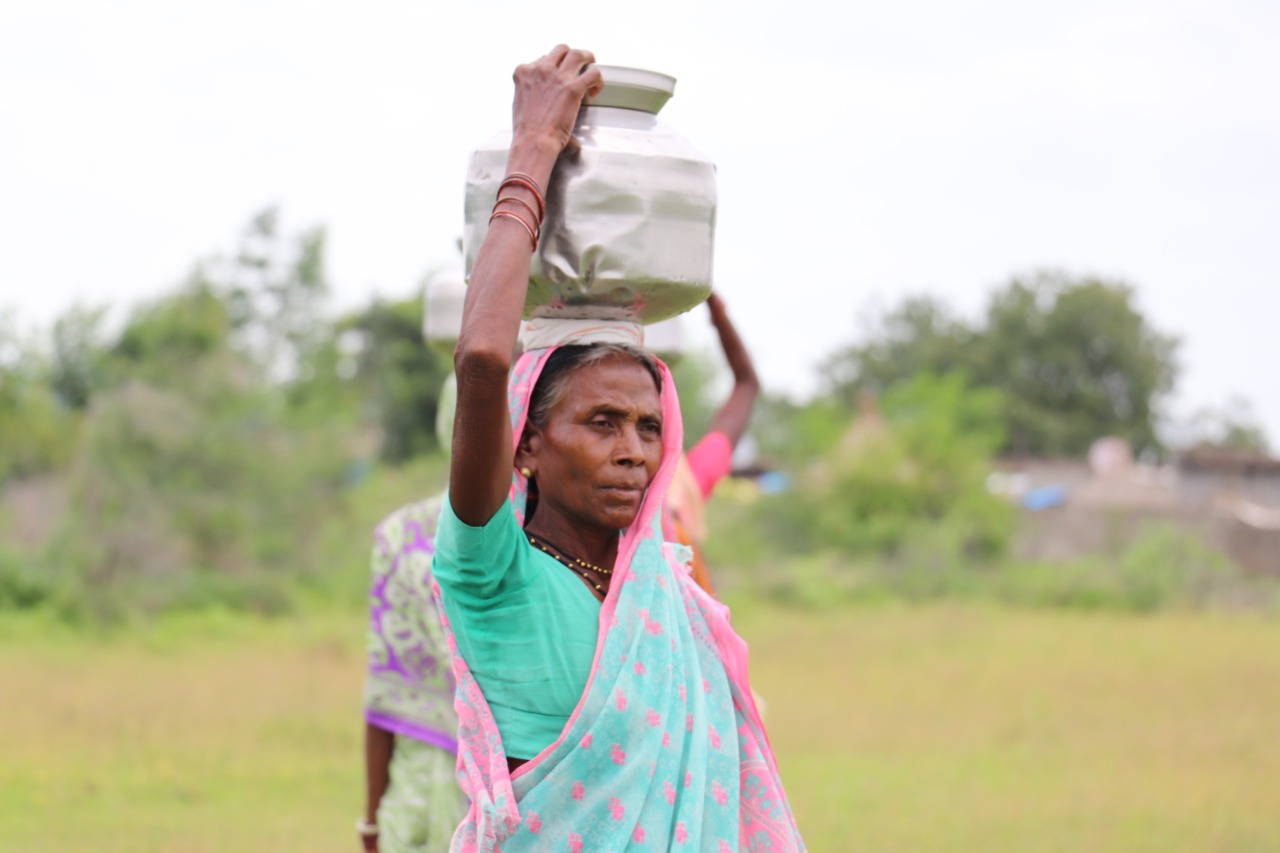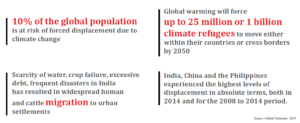- home

- Publication & Resources

- Blog
- Where Will Climate Refugees Go?

Where Will Climate Refugees Go?
Displacement for populations due to erratic and extreme weather,
fallout of climate change, has become a scary reality
for millions of people across swathes of India.
 India is vulnerable, in varying degrees, to a large number of disasters. More than 58.6 per cent of the landmass is prone to earthquakes of moderate to very high intensity; over 40 million hectares (12%) of its land is prone to floods and river erosion; close to 5,700 kms, out of the 7,516 kms long coastline is prone to cyclones and tsunamis; 68% of its cultivable area is vulnerable to droughts; and, its hilly areas are at risk from landslides and avalanches. Moreover, India is also vulnerable to Chemical, Biological, Radiological and Nuclear (CBRN) emergencies and other man-made disasters, according to GSI.
India is vulnerable, in varying degrees, to a large number of disasters. More than 58.6 per cent of the landmass is prone to earthquakes of moderate to very high intensity; over 40 million hectares (12%) of its land is prone to floods and river erosion; close to 5,700 kms, out of the 7,516 kms long coastline is prone to cyclones and tsunamis; 68% of its cultivable area is vulnerable to droughts; and, its hilly areas are at risk from landslides and avalanches. Moreover, India is also vulnerable to Chemical, Biological, Radiological and Nuclear (CBRN) emergencies and other man-made disasters, according to GSI.
 Indian economy is inextricably tied to climate-sensitive sectors like agriculture, which are already facing multiple stresses, and global environmental change could further exacerbate these stresses. Migration and especially internal migration, is already a challenging question and the current discourse does not adequately address pertinent issues such as seasonal and circular migration, portability of rights and social entitlements, lack of formal residency rights among other challenges.
Indian economy is inextricably tied to climate-sensitive sectors like agriculture, which are already facing multiple stresses, and global environmental change could further exacerbate these stresses. Migration and especially internal migration, is already a challenging question and the current discourse does not adequately address pertinent issues such as seasonal and circular migration, portability of rights and social entitlements, lack of formal residency rights among other challenges.
Rising sea level will affect coastal regions where several megacities, such as Mumbai, Kolkata, and Chennai, are located. Flooding along the major rivers along with storm surge impacts and greater salt water intrusion is likely to affect a large number of people due to high population density and poor urban planning. Further, the Himalayan region that has 51 million people practicing hill agriculture whose vulnerability will increase as a result of melting glaciers coupled with an intensification of the monsoon.
Climate change has put the entire universe into imminent risk. It poses significant threat to all of creation. The survival of people, communities, flora and fauna as well as fundamental human rights, are at risk and addressing the risks must be deliberate and holistic. The actions of the rich and powerful have made the poor and the weak suffer the brunt of Climate Change. Growth and capitalist development paradigm being a huge threat to the environment, new and alternative paradigm of inclusive development which is sustainable in nature has to be put in place at the earliest, as the just solution for Climate Change.
Climate change has a greater impact on those sections of the population, in all countries, that are most reliant on natural resources for their livelihoods and or who have the least capacity to respond to natural hazards such as droughts, landslides, floods, hurricane. Women commonly face higher risk and greater burdens from impacts of climate change in situations of poverty and the majority of the world’s poor are women.
Women’s unequal participation in decision making process and labour markets compound inequalities and often prevent women from fully contributing to climate related planning policy making and implementation, for too often women are subject to many society ills that results in lack of mobility lack of access to inputs and production and education resulting in limited business and professional opportunities. Subject to violence and are most impacted by climate change. Women administer sustainable resource management and lead sustainable practices at the household and community level.
 Previous Blog Post Having missed formal education, these young women have vocational skills on their minds
Previous Blog Post Having missed formal education, these young women have vocational skills on their minds Assam & Manipur Floods: We Are Responding
Assam & Manipur Floods: We Are RespondingFeatured Post

International Women’s Day -2021
8 Mar 2021
International Women’s Day -2021 is very special for CASA. It’s a delight to announce, CASA with the support of the Church of Sweden has launched an exclusive Gender Desk to emphasise the importance of Gender Justice work. CASA has been working for Gender Justice all throughout and across our constituencies in all these years. Gender Desk comes to add vigour […]

Overcoming Gender and Poverty Barriers
Poverty has been an inevitable problem in India since the beginning of time. The increasing problems of poverty caused by overpopulation and the unequal distribution of wealth among the people have led to a huge impact on the life of millions in the rural as well as the urban area. A person has to acquire […]

Impact of Climate Change on Women
16 Jan 2021
Climate change is a prevailing problem globally whose hazardous repercussions extend beyond the environment. Shrinking glaciers, extinction of plants and animal species, mutation, rise in the Earth’s average temperature and triggered seasonal fluctuations, are some of the impacts of climate change that have already grabbed the headline. Certain early predictions pertaining to climate changes had […]




